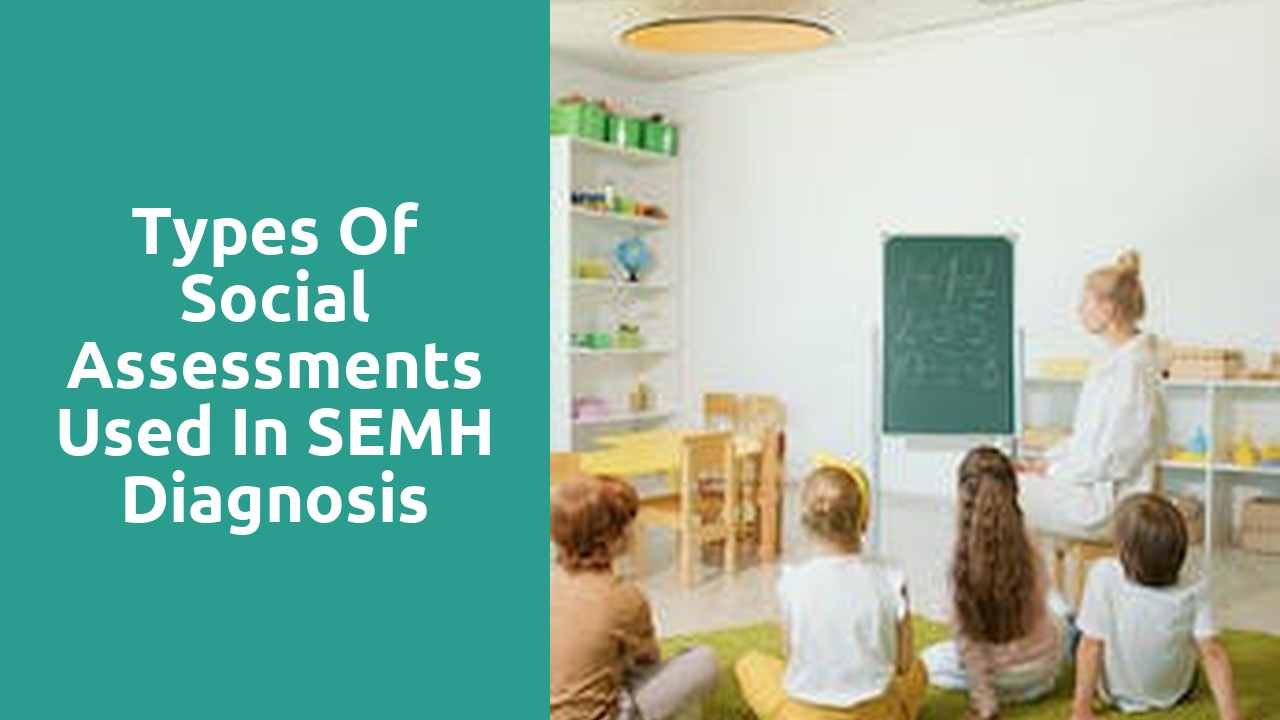

Social evaluation methods play a crucial role in the diagnosis of social-emotional mental health (SEMH) conditions. By examining an individual's social interactions, skills, and abilities, professionals can gain valuable insights into their emotional well-being. These evaluations help identify any underlying issues that may be impacting their social functioning, ultimately aiding in the accurate diagnosis of SEMH disorders.
One commonly used social evaluation method is the analysis of social skills. This involves observing an individual's ability to effectively communicate and interact with others. Professionals assess their verbal and nonverbal communication skills, their ability to engage in reciprocal conversations, and their capacity to understand social cues. By evaluating these skills, clinicians can identify any deficits or impairments that may exist, providing valuable information for the diagnosis and subsequent treatment of SEMH conditions.
Understanding the Role of Social Assessments in SEMH Diagnosis
Social assessments play a crucial role in the diagnosis of Social-Emotional Mental Health (SEMH) conditions. These assessments help professionals gain a deeper understanding of an individual's social functioning and interactions within various settings. By evaluating social skills, behavior patterns, and relationships, these assessments provide valuable insights into the social challenges faced by individuals with SEMH.
One of the primary roles of social assessments in SEMH diagnosis is to identify the specific difficulties individuals may have in understanding and navigating social situations. These assessments analyze factors such as verbal and non-verbal communication skills, social cues interpretation, emotional regulation, and problem-solving abilities. Through these evaluations, healthcare professionals can determine the impact that these challenges may have on an individual's overall well-being and daily life. Additionally, social assessments can help highlight the areas where intervention and support are needed, enabling the development of targeted treatment plans to address social-emotional difficulties.
Assessment techniques play a crucial role in uncovering the intricacies of social-emotional mental health (SEMH) issues. Professionals in the field employ a variety of methods to gain a comprehensive understanding of individuals' social and emotional functioning. One such technique is the use of structured interviews, which provide an opportunity for individuals to express their thoughts, feelings, and experiences, enabling clinicians to assess their social interactions and emotional well-being.
Another prominent assessment technique utilized in the realm of SEMH is self-report questionnaires. By having individuals answer a series of questions about their thoughts, emotions, and behaviors, clinicians can gain valuable insights into their social and emotional functioning. These self-report measures often cover a range of social domains, including social skills, peer relationships, and social anxiety. Through the analysis of these measures, clinicians can identify patterns and gain a deeper understanding of individuals' social-emotional challenges.
Overall, the assessment techniques employed in the field of social-emotional mental health play a crucial role in uncovering individuals' unique challenges and facilitating accurate diagnosis. By utilizing methods such as structured interviews and self-report questionnaires, professionals can obtain a comprehensive understanding of individuals' social and emotional functioning and tailor their interventions accordingly. This meticulous evaluation process ultimately contributes to more effective treatment plans for individuals struggling with SEMH issues.
Social evaluations play a crucial role in the diagnosis of Social-Emotional Mental Health (SEMH) conditions. These evaluations assess an individual's social skills, interactions, and overall functioning in various social settings. By evaluating these factors, experts can gain valuable insights into an individual's emotional well-being and ability to navigate social relationships.
The impact of social evaluations on SEMH diagnosis cannot be overstated. These evaluations provide a comprehensive understanding of an individual's social difficulties, helping clinicians identify the underlying causes of their emotional and behavioral challenges. It allows for a more accurate and personalized diagnosis, enabling the development of tailored treatment plans to address the specific needs and challenges faced by individuals with SEMH conditions. Furthermore, social evaluations help clinicians gauge the progress made during treatment interventions, allowing for adjustments to be made to ensure the most effective and positive outcomes for individuals with SEMH conditions.
Assessing social skills and interactions is crucial in the diagnosis of Social-Emotional Mental Health (SEMH) conditions. These skills and interactions form the foundation of an individual's ability to navigate social situations and build relationships. When assessing social skills, healthcare professionals look for specific markers, such as effective communication, active listening, empathy, and the ability to interpret social cues.
One commonly used method to assess social skills is through observation. Observing individuals in various social situations provides valuable insights into their ability to engage with others and adapt to different social contexts. Additionally, standardized questionnaires and self-report measures are often utilized to gather information about an individual's social skills and interactions from multiple perspectives, including their own self-perception and the perceptions of others in their social circle. By utilizing these diverse assessment techniques, healthcare professionals can gather a comprehensive understanding of an individual's social abilities and identify any areas that may require intervention or support.
Social assessments play a crucial role in the treatment of social-emotional mental health (SEMH) conditions. By evaluating an individual's social skills and interactions, professionals can gain invaluable insights into their overall well-being and tailor their treatment approach accordingly. These assessments help determine the areas in which an individual may be struggling, whether it be in initiating and maintaining relationships, understanding social cues, or managing social anxiety. Armed with this knowledge, practitioners can then develop targeted interventions to address the specific challenges faced by the individual.
SEMH treatment often involves a multi-disciplinary approach, in which various professionals collaborate to provide comprehensive support. Social assessments serve as a foundation for this collaborative effort by informing other practitioners, such as therapists, educators, and counselors, about the individual's social-emotional strengths and weaknesses. This shared understanding enables a more coordinated and integrated approach to treatment, ensuring that all aspects of the individual's social functioning are addressed holistically. By incorporating social assessments into the treatment process, practitioners can maximize the effectiveness of interventions and enhance the individual's overall social well-being.